Scientific News
Are fruit, veggies and orange juice good for memory?
 Science regularly praises the health benefits or warns us of the dangers of consuming various foods. The same food or beverage may even be both lauded and vilified from one year to the next, and from one study to another (coffee, for example). But the results of the current study are based on data collected from a population of nearly 28,000 men over a period of 20 years. Here’s a summary of the research recently published in Neurology.
Science regularly praises the health benefits or warns us of the dangers of consuming various foods. The same food or beverage may even be both lauded and vilified from one year to the next, and from one study to another (coffee, for example). But the results of the current study are based on data collected from a population of nearly 28,000 men over a period of 20 years. Here’s a summary of the research recently published in Neurology.Changzheng Yuan and her colleagues at Harvard T.H. Chan School of Public Health wanted to assess the potential link between long term fruit and vegetable consumption and subjective cognitive function (SCF). They followed 27,842 men (all ...
Can stimulating the brain alleviate chronic pain?
 A great number of people suffer from lower back pain. The pain can begin at any age with peak onset occurring during adolescence or around age 45. A team of researchers from the University of North Carolina recently published a study that could prove promising in the treatment of this form of chronic pain without the need for drugs. What if targeted brain stimulation could relieve chronic back pain?
A great number of people suffer from lower back pain. The pain can begin at any age with peak onset occurring during adolescence or around age 45. A team of researchers from the University of North Carolina recently published a study that could prove promising in the treatment of this form of chronic pain without the need for drugs. What if targeted brain stimulation could relieve chronic back pain?Several studies have shown that chronic pain is the leading cause of disability worldwide. According to the authors of the present study, by focusing on the peripheral causes of pain, most of these studies have overlooked the role played by brain activity in the disease. F. Fröhlich, ...
Can breathing influence memory?
 We usually breathe through the nose, but switch to mouth breathing when we have a cold or during intense exercise. Swedish and Dutch scientists explored these two ways of breathing in order to determine which one was more beneficial to memory formation. Specifically, the research focused on olfactory memory consolidation.
We usually breathe through the nose, but switch to mouth breathing when we have a cold or during intense exercise. Swedish and Dutch scientists explored these two ways of breathing in order to determine which one was more beneficial to memory formation. Specifically, the research focused on olfactory memory consolidation. Three main steps are involved in memory: encoding, consolidation, and retrieval. Encoding involves the ability to acquire new information from our senses. Consolidation allows us to maintain memories over time. Finally, through retrieval, we can extract and recall previously learned and stored information. Many studies have already highlighted the role of ...
Do dogs understand our words?
 “Many dog owners think that their dogs know what some words mean, but there really isn’t much scientific evidence to support that,” says Ashley Prichard, co-author of the study that will be discussed in this article. How can we be sure that when a dog gets excited upon hearing "rabbit," he’s really imagining the animal and understands the meaning of the word? This research conducted at Emory University in Atlanta unravels this mystery...
“Many dog owners think that their dogs know what some words mean, but there really isn’t much scientific evidence to support that,” says Ashley Prichard, co-author of the study that will be discussed in this article. How can we be sure that when a dog gets excited upon hearing "rabbit," he’s really imagining the animal and understands the meaning of the word? This research conducted at Emory University in Atlanta unravels this mystery...To the extent that canines are able to obey verbal commands, they have the ability to process certain aspects of human language. But associating a word with an action (“fetch!)” doesn’t necessarily mean the animal understands ...
Is our sense of direction related to our sense of smell?
 Recent research suggests that the main purpose of olfaction may be to help us navigate. According to this “olfactory spatial hypothesis,” our sense of smell may have evolved to help us locate ourselves in space. With this in mind, a Canadian study sought to explore the link between our ability to identify odors and our spatial memory. It was an opportunity to find out whether having a highly developed sense of smell could help us find our bearings...
Recent research suggests that the main purpose of olfaction may be to help us navigate. According to this “olfactory spatial hypothesis,” our sense of smell may have evolved to help us locate ourselves in space. With this in mind, a Canadian study sought to explore the link between our ability to identify odors and our spatial memory. It was an opportunity to find out whether having a highly developed sense of smell could help us find our bearings...While not all animals are able to see and hear, most use smells to orient themselves, find food, and avoid predators. In addition, scientists have already found that in mammals, birds, reptiles, and fish, the size of the olfactory ...
Ever heard of "cute aggression?"
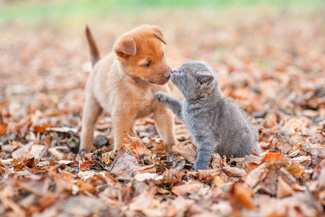 “Oh, what a cute baby!” Have you noticed that some people (perhaps you yourself?) can't help pinching the cheeks of an infant they find really adorable? This phenomenon, known as “cute aggression,” is defined as a need to pinch, squeeze or even bite cute beings, without any desire to harm. Two researchers from the University of California at Riverside wanted to better understand this behavior by studying the underlying neural basis.
“Oh, what a cute baby!” Have you noticed that some people (perhaps you yourself?) can't help pinching the cheeks of an infant they find really adorable? This phenomenon, known as “cute aggression,” is defined as a need to pinch, squeeze or even bite cute beings, without any desire to harm. Two researchers from the University of California at Riverside wanted to better understand this behavior by studying the underlying neural basis. The "cute aggression” phenomenon was initially highlighted in a study by Aragón et al. (2015) that involved individual self-evaluations using images of baby humans and animals. The behavior was discussed as being the dimorphic ...
Is the smell of lavender relaxing?
 Aside from those with allergies, most people enjoy the smell of lavender. Found on terraces, in gardens, in cosmetic products and detergents, this plant may soon be found in hospitals as well. Before beginning any tests in humans, Japanese researchers studied its anxiolytic properties in mice in order to determine whether the smell of lavender could be effective in treating anxiety.
Aside from those with allergies, most people enjoy the smell of lavender. Found on terraces, in gardens, in cosmetic products and detergents, this plant may soon be found in hospitals as well. Before beginning any tests in humans, Japanese researchers studied its anxiolytic properties in mice in order to determine whether the smell of lavender could be effective in treating anxiety.As the authors remind us in the introduction of their article published in Frontiers in Behavioral Neuroscience, along with pharmaceutical anxiolytic drugs, aromatic oils derived from plant extracts are already used in traditional medicine to treat anxiety. These extracts include linalool, a ...
Do cats understand physics ?
 In our newsletters, we sometimes report on dogs, crows, or even sea snails, but we rarely mention cats. Let’s rectify this oversight by looking at some Japanese research published in Animal Cognition, which highlights their ability to (humbly) understand some basic laws of physics, first documented by the likes of Newton and Einstein.
In our newsletters, we sometimes report on dogs, crows, or even sea snails, but we rarely mention cats. Let’s rectify this oversight by looking at some Japanese research published in Animal Cognition, which highlights their ability to (humbly) understand some basic laws of physics, first documented by the likes of Newton and Einstein. In their previous work, S. Takagi and her colleagues from the department of psychology at the University of Kyoto (Japan) showed that, using their hearing, cats could predict the presence of an invisible object. This ability to understand the principle of cause (sound) and effect (material presence) can be attributed to their sharp hearing. ...
How many faces can one person recognize?
 You've probably never asked yourself this question, but no matter, science is here to answer it anyway! Indeed, our facial recognition abilities allow us to identify a great number of people. But just how many? Research published in Acts of the Royal Society B looked into the question and proposed a method for putting forth the following estimate: 5000. Let’s take a closer look.
You've probably never asked yourself this question, but no matter, science is here to answer it anyway! Indeed, our facial recognition abilities allow us to identify a great number of people. But just how many? Research published in Acts of the Royal Society B looked into the question and proposed a method for putting forth the following estimate: 5000. Let’s take a closer look. As a prelude to their study, the authors remind us that for most of history, humans have lived in small, scattered groups. But over the last few centuries, the worldwide population has increased dramatically, and this has consequences on our facial recognition capacities. In addition to all the ...
Using crows for litter clean-up
 You may know the story of the crow and the pitcher… but in this study the crows are carrying cigarette butts instead of pebbles! Through this article, we’ll revisit this ancient fable with a modern twist. In previous newsletters, we’ve had a chance to highlight the crow’s intelligence, particularly its ability to plan ahead. But believe it or not, since August 13, 2018, six of these birds have been collecting cigarette butts and other trash at the Puy de Fou amusement park in France. How is this possible?
You may know the story of the crow and the pitcher… but in this study the crows are carrying cigarette butts instead of pebbles! Through this article, we’ll revisit this ancient fable with a modern twist. In previous newsletters, we’ve had a chance to highlight the crow’s intelligence, particularly its ability to plan ahead. But believe it or not, since August 13, 2018, six of these birds have been collecting cigarette butts and other trash at the Puy de Fou amusement park in France. How is this possible?Former research on crows has shown that they are capable of making and using tools to obtain food. They are also capable of holding a grudge and can remember when a human ...
Can electric current make us good at math?
 What if instead of giving schoolchildren hours of seemingly irrelevant math problems to solve, we equipped them with an electrode helmet that delivers (for a good cause) small electric shocks? Rest assured, this isn’t about to happen yet! But this experiment did take place, and it appears to be effective. Let’s take a look at this research that’s come back onto the scientific scene several years after its initial publication.
What if instead of giving schoolchildren hours of seemingly irrelevant math problems to solve, we equipped them with an electrode helmet that delivers (for a good cause) small electric shocks? Rest assured, this isn’t about to happen yet! But this experiment did take place, and it appears to be effective. Let’s take a look at this research that’s come back onto the scientific scene several years after its initial publication.Until now, the benefits of non-invasive brain stimulation on cognitive function have often been deduced from behavioral observations and by carrying out basic tasks. In the present study, the team of researchers from Oxford University (UK) used ...
Why don’t soccer fans see the same match?
 You’ll likely agree that criticizing the calls made by the referee is quite common among soccer fans. Team A’s fans think that the guy in black hasn’t called enough fouls against the players of the opposing team, and the same goes for Team B’s fans! British researchers have taken a closer look into this phenomenon. Using brain imaging, they tried to explain how fans can have such widely diverging opinions on the same match.
You’ll likely agree that criticizing the calls made by the referee is quite common among soccer fans. Team A’s fans think that the guy in black hasn’t called enough fouls against the players of the opposing team, and the same goes for Team B’s fans! British researchers have taken a closer look into this phenomenon. Using brain imaging, they tried to explain how fans can have such widely diverging opinions on the same match. The study carried out by Timothy J. Andrews and his colleagues at the University of York’s Department of Psychology wanted to explore the neural basis of these group differences under natural conditions. The aim was to determine whether these ...
How does our brain suppress the desire for revenge?
 Who wants to play the “Inequality game?” The winner is whoever succeeds in causing a feeling of injustice (and therefore anger) in his or her opponents. Several participants tested out this rather original “game” as part of a Swiss study. The experiment aimed to better understand the cerebral mechanisms that underlie anger and the desire to punish those responsible for putting us in this state. Discover how our brain manages to control its desire for revenge…
Who wants to play the “Inequality game?” The winner is whoever succeeds in causing a feeling of injustice (and therefore anger) in his or her opponents. Several participants tested out this rather original “game” as part of a Swiss study. The experiment aimed to better understand the cerebral mechanisms that underlie anger and the desire to punish those responsible for putting us in this state. Discover how our brain manages to control its desire for revenge… Few studies have investigated the neuronal functions involved in disassociating angry feelings from the regulation of aggressive reactions (responses or punitive behaviors). As specified by the study’s authors, ...
Why does the brain become more efficient during adolescence?
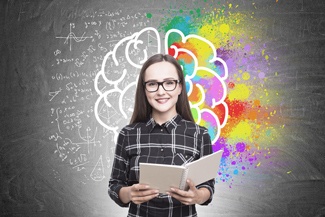 Adolescence… we’ve all lived through this period characterized by profound physical, emotional, and cognitive changes… a period that’s also marked by a great potential for neuroplasticity. To shine greater light on brain development during this period, researchers at the University of Oslo (Norway) studied fMRI data from more than 700 people. Read on to discover the changes that take place in a teenager’s brain.
Adolescence… we’ve all lived through this period characterized by profound physical, emotional, and cognitive changes… a period that’s also marked by a great potential for neuroplasticity. To shine greater light on brain development during this period, researchers at the University of Oslo (Norway) studied fMRI data from more than 700 people. Read on to discover the changes that take place in a teenager’s brain. To characterize age-related differences in functional connectivity in the adolescent brain, Norwegian researchers studied fMRI data recorded during a state of rest and during a cognitive task designed to solicit working memory. The data came from a previous ...
Can a poorly knotted tie be dangerous to your health?
 Has the tie become a dangerous gift to give to a man? We’re not talking about whether it’s his style, but indeed whether it poses a real danger to his health. Neurologists at the Schleswig-Holstein University Hospital in Germany conducted a study to evaluate the effects of this clothing accessory on the brain. Can wearing a tie really be dangerous?
Has the tie become a dangerous gift to give to a man? We’re not talking about whether it’s his style, but indeed whether it poses a real danger to his health. Neurologists at the Schleswig-Holstein University Hospital in Germany conducted a study to evaluate the effects of this clothing accessory on the brain. Can wearing a tie really be dangerous? “The knot is to the tie as the brain is to the man,” said François de La Rochefoucauld. But you still have to know how to tie it! The Windsor knot (the most common) was chosen for the study reported here. The German researchers recruited 30 young men and divided them into two groups: “necktie” and “no necktie.” ...
Can infants distinguish a good leader from a bully?
 “Bed time!” Imagine 21-month-old babies watching a short cartoon where characters interact with someone who asks them to go to bed. This protagonist may be depicted either as a good leader or as a despot. From this experiment, the researchers tried to determine if infants are capable of distinguishing between a good leader and a bully.
“Bed time!” Imagine 21-month-old babies watching a short cartoon where characters interact with someone who asks them to go to bed. This protagonist may be depicted either as a good leader or as a despot. From this experiment, the researchers tried to determine if infants are capable of distinguishing between a good leader and a bully. The study, carried out by researchers from the Department of Psychology and Cognitive Science at the University of Trento (Italy) and from the Department of Psychology at the University of Illinois (USA) focused on the distinction between these two major types of social power. One is based on authority, the other on intimidation. Previous studies ...
Learning music: a good way to develop executive function?
 While at the beginning it may be painful to the ears of those around us, learning to play a musical instrument can not only offer personal fulfillment, it may also be beneficial to our brains. A new study published in the review Plos One has shown that early musical training could even optimize the development of executive function in children. Let’s take a look at the research.
While at the beginning it may be painful to the ears of those around us, learning to play a musical instrument can not only offer personal fulfillment, it may also be beneficial to our brains. A new study published in the review Plos One has shown that early musical training could even optimize the development of executive function in children. Let’s take a look at the research.Executive functions are complex cognitive functions that help us manage voluntary and organizational behaviors. They come into play when we are facing a novel or non-routine situation and involve three processes: inhibition (to prevent or stop us from producing a response), flexibility (to change from one ...
Do bees understand zero?
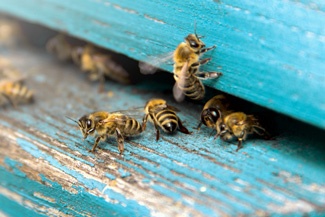 Beekeepers have been denouncing the neurotoxic products that threaten our bee populations for years, and for good reason. In addition to their crucial role in pollination, bees also make terrific subjects for animal cognition research. A team of Franco-Australian researchers recently studied these insects' understanding of the concept of zero. More broadly, they wanted to answer the question: are bees capable of mathematical abstraction?
Beekeepers have been denouncing the neurotoxic products that threaten our bee populations for years, and for good reason. In addition to their crucial role in pollination, bees also make terrific subjects for animal cognition research. A team of Franco-Australian researchers recently studied these insects' understanding of the concept of zero. More broadly, they wanted to answer the question: are bees capable of mathematical abstraction?According to the study’s authors, "zero" is a mathematical concept that's not easy to understand. They remind readers that it takes children several years to master. Indeed, the “void” isn’t naturally associated with a mathematical concept; ...
Does stress affect our cognitive abilities?
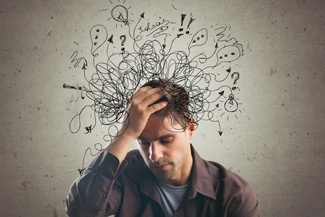 At reasonable levels, stress can be a motivator and a means to excel. But you have to be able to manage in order to reap the benefits. A team of researchers from the University of Pennsylvania recently examined the effects of anticipated stress on cognition. In concrete terms, the scientists measured whether, beginning upon waking, stressing about what might happen to us during the day had an impact on cognitive abilities.
At reasonable levels, stress can be a motivator and a means to excel. But you have to be able to manage in order to reap the benefits. A team of researchers from the University of Pennsylvania recently examined the effects of anticipated stress on cognition. In concrete terms, the scientists measured whether, beginning upon waking, stressing about what might happen to us during the day had an impact on cognitive abilities.General Adaptation Syndrome, or GAS (the scientific name for stress), was clearly identified in 1936 by Professor Hans Selye. According to the endocrinologist, GAS is a set of physiological responses the body goes through when subjected to environmental ...
Which human emotions are dogs most sensitive to?
 Through contact with humans, dogs have developed socio-cognitive skills that allow them to communicate with us. For example, they are able to distinguish different emotions on our faces. A recent study carried out by the University of Bari (Italy) tried to determine whether dogs were more “sensitive” to particular emotions. Are dogs more “receptive” to a face that demonstrates fear, surprise, anger or sadness? Read on to find out.
Through contact with humans, dogs have developed socio-cognitive skills that allow them to communicate with us. For example, they are able to distinguish different emotions on our faces. A recent study carried out by the University of Bari (Italy) tried to determine whether dogs were more “sensitive” to particular emotions. Are dogs more “receptive” to a face that demonstrates fear, surprise, anger or sadness? Read on to find out. Research has already demonstrated that canines process human faces in the same way we do: by analyzing facial features (mostly the eyes, nose, and mouth). This is how they are able to recognize familiar faces, distinguish neutral or emotional ...
Is feeling young good for the brain?
 Sure, we all age. But each of us perceives the passing years very differently. For example, are you one of those people who feels younger than their age? If you are, the “rejuvenation” you feel could be beneficial to your brain. For the first time, a South Korean study has highlighted the link between our subjective age and brain aging. Does feeling younger than we really are support cognitive health?
Sure, we all age. But each of us perceives the passing years very differently. For example, are you one of those people who feels younger than their age? If you are, the “rejuvenation” you feel could be beneficial to your brain. For the first time, a South Korean study has highlighted the link between our subjective age and brain aging. Does feeling younger than we really are support cognitive health? Why do some people feel younger or older than their real age? This is the question behind the research conducted by a team of scientists from the departments of psychology and sociology at the National Universities of Seoul and Yonsei in South Korea. The age we feel, or our ...
Are social ties the keys to cognitive health?
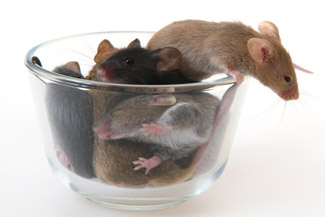 Having a large social network is one of the factors that may contribute to a healthy brain. But the benefits of maintaining or expanding social connections hasn’t received much research attention. One study has recently done just this by examining these ties between our social network and cognitive health. While it focuses on mice, it may still offer interesting information on one of the possible keys to brain health in humans.
Having a large social network is one of the factors that may contribute to a healthy brain. But the benefits of maintaining or expanding social connections hasn’t received much research attention. One study has recently done just this by examining these ties between our social network and cognitive health. While it focuses on mice, it may still offer interesting information on one of the possible keys to brain health in humans. Few animal studies have looked into the potential neuroprotective effects of a social network. Moreover, the little research that does exist mostly compares socially isolated animals to those living in groups. Until now, in both rodents and humans, ...
Can animals mentally replay past events?
 It’s the end of the day: you’re going home, but when you’re about to open the front door, you can't find your keys! Don’t worry, thanks to your episodic memory, you’ll be able to recall all of the specific events you experienced today. And by going back in time, you'll eventually find your keys and return home. We humans are indeed able to replay past episodes from our lives. But what about animals? Research has revealed that rats also share this ability.
It’s the end of the day: you’re going home, but when you’re about to open the front door, you can't find your keys! Don’t worry, thanks to your episodic memory, you’ll be able to recall all of the specific events you experienced today. And by going back in time, you'll eventually find your keys and return home. We humans are indeed able to replay past episodes from our lives. But what about animals? Research has revealed that rats also share this ability. As you know, memory comes in many forms, and our episodic memory allows us to mentally travel in time; our episodic memories are characterized by the repetition of several unique events in sequential order. And the ...
Is our brain like a bee colony?
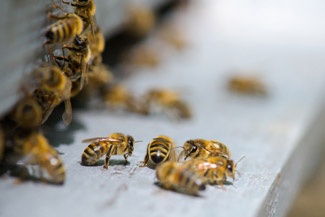 Besides the need to protect them because they play a fundamental role in pollination (which is essential to the survival of many plant and animal species), bees can tell us a lot about how our brains work. A research team from Sheffield studied their behavior and discovered analogies to the way our neurons interact during the decision-making process. How can a colony of bees be related to the human brain?
Besides the need to protect them because they play a fundamental role in pollination (which is essential to the survival of many plant and animal species), bees can tell us a lot about how our brains work. A research team from Sheffield studied their behavior and discovered analogies to the way our neurons interact during the decision-making process. How can a colony of bees be related to the human brain?A colony of honeybees works as a whole; each of its members depends on the others for survival. This specificity, also found in ants, intrigued scientists, especially those interested in psychophysics. This science studies the links between physical stimuli and the resulting ...
Does working on the top floor of a building increase risk-taking?
 Tell me which floor your office is on and I’ll tell you how risky your investment proposal is! While we might prefer otherwise, we all know that investment and legal decisions aren't always completely objective, especially because they are linked to the personalities of the actors involved. And a new and unexpected factor has just been unveiled in a study published in the Journal of Consumer Psychology: the altitude at which we make a financial decision. Let’s see the full details.
Tell me which floor your office is on and I’ll tell you how risky your investment proposal is! While we might prefer otherwise, we all know that investment and legal decisions aren't always completely objective, especially because they are linked to the personalities of the actors involved. And a new and unexpected factor has just been unveiled in a study published in the Journal of Consumer Psychology: the altitude at which we make a financial decision. Let’s see the full details. The research team led by Sina Esteky, an assistant professor of marketing at Miami University’s business school, first looked at data from more than 3,000 hedge funds from 2013 (500 ...
Can virtual reality improve learning?
 Welcome to the virtual palace of memory. In this special place, you may meet Michael Jackson, Napoleon Bonaparte, Donald Duck or even Martin Luther King Jr. There are two ways to visit: on a computer screen where you move around using your mouse; or using a virtual reality headset where you are completely immersed in the environment. And if at the end of the visit, we asked you to remember where you had seen the different characters, in which one of these visiting modes do you think you would remember best?
Welcome to the virtual palace of memory. In this special place, you may meet Michael Jackson, Napoleon Bonaparte, Donald Duck or even Martin Luther King Jr. There are two ways to visit: on a computer screen where you move around using your mouse; or using a virtual reality headset where you are completely immersed in the environment. And if at the end of the visit, we asked you to remember where you had seen the different characters, in which one of these visiting modes do you think you would remember best?Virtual reality is a computer technology that allows users to physically dive into an artificial environment that reproduces sensory experiences, including sight, sound, touch ...
How does a soccer fan's brain work?
 With the FIFA World Cup taking place in Russia, we thought it was an appropriate time to take a look at this study published in Scientific Report in November 2017. Whether you’re a soccer fanatic or not, discover what happens in the brain of a soccer fan who feels they're part of a group, a family. What sorts of altruist behavior do they show?
With the FIFA World Cup taking place in Russia, we thought it was an appropriate time to take a look at this study published in Scientific Report in November 2017. Whether you’re a soccer fanatic or not, discover what happens in the brain of a soccer fan who feels they're part of a group, a family. What sorts of altruist behavior do they show?Belonging to a group is considered to be a basic human need. Research has shown that humans have a tendency to favor their ingroup, or the group to which one belongs. In this area, soccer fans provide extraordinary research subjects. Their behaviors show their strong attachment to the group, their real and constant solidarity. But ...
Can we transfer memories from one living being to another?
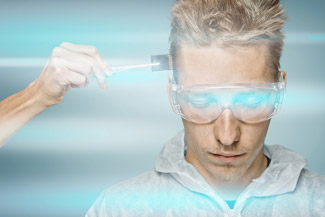 David Glanzman expects to see a lot of surprise and skepticism in response to the study discussed here. He and his colleagues at the University of California, Los Angeles have managed to transfer memories from one sea snail to another. Their experiment raises questions about our conception of memory, something which was little debated in the (neuro) scientific community until now. Let’s take a look at why this transfer of memory in mollusks should be approached with care.
David Glanzman expects to see a lot of surprise and skepticism in response to the study discussed here. He and his colleagues at the University of California, Los Angeles have managed to transfer memories from one sea snail to another. Their experiment raises questions about our conception of memory, something which was little debated in the (neuro) scientific community until now. Let’s take a look at why this transfer of memory in mollusks should be approached with care.Before delving into the experimental details and the debate they provoke, it should be noted that the research conducted by Glanzman focuses on the study of the engram, a biological trace of memory in the ...
Can friendship be seen in the brain?
 Birds of a feather flock together. Can this popular saying be seen in the brain? Empirically speaking, sociology has shown that we associate with people that are like us; something known as (social) homophily. American researchers have studied this phenomenon on a neural level. As incredible as it may seem, they were able to identify a person’s friends by analyzing their reactions in the brain while watching video clips! Let’s take a closer look.
Birds of a feather flock together. Can this popular saying be seen in the brain? Empirically speaking, sociology has shown that we associate with people that are like us; something known as (social) homophily. American researchers have studied this phenomenon on a neural level. As incredible as it may seem, they were able to identify a person’s friends by analyzing their reactions in the brain while watching video clips! Let’s take a closer look. The intuition that we tend to choose friends who are like ourselves has been confirmed through research on homophily. The sociological variables that help forge social ties include social origin, age, education, place of ...
Do jazz and classical pianists' brains work the same way?
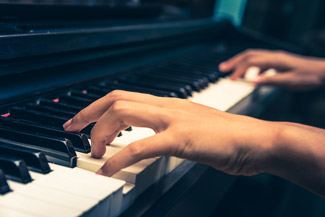 It may be an anachronism, but if Duke Ellington and Wolfgang Amadeus Mozart had to play the same piece of music, do you think their brains would show similar activity? According to a study published in NeuroImage, the brains of jazz pianists don't operate quite the same way as their classical counterparts. But why would a musician's brain activity change depending on the kind of music they play?
It may be an anachronism, but if Duke Ellington and Wolfgang Amadeus Mozart had to play the same piece of music, do you think their brains would show similar activity? According to a study published in NeuroImage, the brains of jazz pianists don't operate quite the same way as their classical counterparts. But why would a musician's brain activity change depending on the kind of music they play?Playing music requires highly developed brain structures with complex interactions between various abilities, and musical training induces sensorimotor plasticity. Previous research has already established that, for certain tasks, the brains of musicians work differently than those of ...
Can neuroergonomics optimize airplane pilot training?
 In just a few years, planes may be able to use an interface to assess the cognitive and emotional states of their pilots and "act" accordingly to ensure the safety and well-being of passengers and flight attendants. Carried out by the ISAE Aeronautics and Space Insititute (Toulouse, France), a recent study has demonstrated the potential benefits of monitoring brain activity in pilots during real flight conditions. It’s an opportunity to discover how neuroergonomics can optimize human-machine interactions.
In just a few years, planes may be able to use an interface to assess the cognitive and emotional states of their pilots and "act" accordingly to ensure the safety and well-being of passengers and flight attendants. Carried out by the ISAE Aeronautics and Space Insititute (Toulouse, France), a recent study has demonstrated the potential benefits of monitoring brain activity in pilots during real flight conditions. It’s an opportunity to discover how neuroergonomics can optimize human-machine interactions. There is growing interest in the use of tools to monitor individuals’ cognitive performance in their work environment and daily lives. Known as neuroergonomics, this area of ...
When it comes to advertising, do monkeys and humans have the same taste?
 While we humans may be used to seeing a scantily clad man or woman touting the bottle of perfume of a particular brand, how do monkeys feel about sex and notoriety in advertising? Sure, amongst the ranks of crazy research, this study certainly has its place, but it does nevertheless raise an interesting question: can we induce brand preferences in monkeys, as we can in humans?
While we humans may be used to seeing a scantily clad man or woman touting the bottle of perfume of a particular brand, how do monkeys feel about sex and notoriety in advertising? Sure, amongst the ranks of crazy research, this study certainly has its place, but it does nevertheless raise an interesting question: can we induce brand preferences in monkeys, as we can in humans?As a preamble to their study, researchers at the Universities of Stanford, Colorado – Boulder, Durham and Pennsylvania remind us that sexual representations and social status are always a reliable means of arousing consumer desire. Many experiments have shown that explicit sexual content in an ad increases ...
Can we guess what someone is thinking?
 I’m thinking of someone right now. Can you guess who it is? Probably not! Yet, incredible as it may sound, we’re now able to read into people's brains. Through a new process developed by a team of researchers from the Department of Psychology at the University of Scarborough (Canada), we’re now able to digitally recreate the image of the person someone is thinking about. How is this possible?
I’m thinking of someone right now. Can you guess who it is? Probably not! Yet, incredible as it may sound, we’re now able to read into people's brains. Through a new process developed by a team of researchers from the Department of Psychology at the University of Scarborough (Canada), we’re now able to digitally recreate the image of the person someone is thinking about. How is this possible?According to Dan Nemrodov, a co-author of the article published in eNeuro: “When we see something, our brain creates a mental percept, which is essentially a mental impression of that thing. We were able to capture this percept using EEG to get a direct illustration of what’s ...
Do numbers come naturally to newborns?
 In humans, the representation of numbers and space are deeply intertwined. We create mental representations of numbers on a line from left to right, with the smallest numbers on the left and the largest numbers on the right. Italian researchers have shown that hours after birth, newborns already have a rudimentary sense of numbers. Their study raises the following question: is the mental spatial representation of numbers innate?
In humans, the representation of numbers and space are deeply intertwined. We create mental representations of numbers on a line from left to right, with the smallest numbers on the left and the largest numbers on the right. Italian researchers have shown that hours after birth, newborns already have a rudimentary sense of numbers. Their study raises the following question: is the mental spatial representation of numbers innate? In the preamble to their study, Rosa Rugani and her collegues (Universities of Padua and Trento, Italy) present recent research that calls into question the belief that humans represent numbers on a mental number line (MNL) based on their reading/writing ...
Can having the right color jersey help you win the match?
 Have you ever heard an athlete complain that they weren't wearing their lucky jersey after losing a game? Athletes are often superstitious, and sometimes they may focus on the color of their uniform. But lots of people think that an athlete's chances of winning depend on the color they're wearing. A study on judo looked into just this question. To win a fight, is it better to have a blue or white judogi?
Have you ever heard an athlete complain that they weren't wearing their lucky jersey after losing a game? Athletes are often superstitious, and sometimes they may focus on the color of their uniform. But lots of people think that an athlete's chances of winning depend on the color they're wearing. A study on judo looked into just this question. To win a fight, is it better to have a blue or white judogi?Evolutionary psychologists are interested in the influence of color on athlete performance during competition. For example, they consider what are called “red effects:" (empirical) evidence of the positive influence of wearing red in a competition. They attribute these effects ...
Why are green vegetables good for the brain?
 "Spinach? Gross!” Do you remember saying this as a kid? Maybe you love it now that you’re an adult? If broccoli and other veggies are fairly popular today; this wasn’t always the case. In addition to their digestive benefits, a recent American study shows that regularly consuming green vegetables could delay cognitive decline. Why are these foods good for our brains?
"Spinach? Gross!” Do you remember saying this as a kid? Maybe you love it now that you’re an adult? If broccoli and other veggies are fairly popular today; this wasn’t always the case. In addition to their digestive benefits, a recent American study shows that regularly consuming green vegetables could delay cognitive decline. Why are these foods good for our brains?Good nutrition may contribute to good cognitive health. Martha Clare Morris and her colleagues at Rush University Medical Center in Chicago wanted to study the effects of the primary and bioactive nutrients found in leafy, green vegetables (salad, cabbage, celery, etc.); namely vitamin K (phylloquinone), lutein, ...
Love at first sight: what happens in the brain?
 Two pigeons smooching on a branch; aren’t they adorable? How did the two of them fall in love? Actually, much like us: suddenly, unpredictably, and automatically. The experience of falling head-over-heels in love intrigues us because we don’t really know what’s happening. Yves Agid, a professor and researcher in neurology and neuroscience is helping us to better understand love at first sight. What happens in our brain when we suddenly fall in love?
Two pigeons smooching on a branch; aren’t they adorable? How did the two of them fall in love? Actually, much like us: suddenly, unpredictably, and automatically. The experience of falling head-over-heels in love intrigues us because we don’t really know what’s happening. Yves Agid, a professor and researcher in neurology and neuroscience is helping us to better understand love at first sight. What happens in our brain when we suddenly fall in love? A racing pulse, sweating, a feeling like an electric current, etc.: these physical “symptoms” are the manifestation of intense, yet uncontrolled emotions that each of us have felt in the presence of a perfect stranger. In an ...
Can we predict a person s creative potential?
 In the arts and sciences, but also in everyday life, creative thinking is central. Recently studies in psychology and neuroscience have identified the regions of the brain involved in creativity. A new international study more precisely reveals the neural architecture behind a highly creative brain. It’s an opportunity to answer the question: why are certain people more creative than others?
In the arts and sciences, but also in everyday life, creative thinking is central. Recently studies in psychology and neuroscience have identified the regions of the brain involved in creativity. A new international study more precisely reveals the neural architecture behind a highly creative brain. It’s an opportunity to answer the question: why are certain people more creative than others?For their study, Roger E. Beaty (a psychologist at Harvard) and his Austrian and Chinese colleagues focused on the neurocognitive characteristics of highly creative people. They wanted to find out whether there is a specific profile of brain connectivity in these individuals and whether ...
Can we comfort others by simply holding their hands?
 Holding someone’s hand when they’re feeling stressed is a natural and often instinctive act, but not an insignificant one. A Franco-Israeli-American research team has just demonstrated the comforting power of human touch, in particular because it synchronizes the brain waves of the sufferer with those of the comforter. How can holding someone’s hand be helpful?
Holding someone’s hand when they’re feeling stressed is a natural and often instinctive act, but not an insignificant one. A Franco-Israeli-American research team has just demonstrated the comforting power of human touch, in particular because it synchronizes the brain waves of the sufferer with those of the comforter. How can holding someone’s hand be helpful?Today, the analgesic powers of social interaction, empathy, and physical contact remain unclear. The study, published in Proceedings of the National Academy of Sciences (PNAS) was carried out by researchers at the Universities of Colorado (US), Haifa (Israel), and Paris Diderot (France) with the goal of testing ...
When do infants start to perceive fear?
 Emotionally and socially, being able to perceive facial emotions is very important. It’s a skill that involves a great number of neural circuits. Normally, frightened faces aren’t a common sight in an infant’s environment. But, researchers from the psychology and neurocognition laboratory at the University of Grenoble (France) wanted to study the perception of fear in babies. At what age were they able to detect fear on a face?
Emotionally and socially, being able to perceive facial emotions is very important. It’s a skill that involves a great number of neural circuits. Normally, frightened faces aren’t a common sight in an infant’s environment. But, researchers from the psychology and neurocognition laboratory at the University of Grenoble (France) wanted to study the perception of fear in babies. At what age were they able to detect fear on a face?In children, the capacity to classify certain facial emotions, and particularly fear, appears at about 5-7 months. Eyes wide, eyebrows raised, mouth open: these stimuli tend to hold the baby’s attention. The researchers hypothesized that fearful ...
Can happiness be taught?
 300 students enrolled in the first course and… 1200 in the second. A new record! The former record was held by a course entitled "Psychology and the Law,” taken by 1050 students in 1992. Taught since January 2018 by Laurie Santos, “Psychology and the good life” is praised by Yale students. But why the success?
300 students enrolled in the first course and… 1200 in the second. A new record! The former record was held by a course entitled "Psychology and the Law,” taken by 1050 students in 1992. Taught since January 2018 by Laurie Santos, “Psychology and the good life” is praised by Yale students. But why the success?In an interview with NBC News, Laurie Santos, a professor of psychology, tells us that her class was created in reaction to the alarming research on students’ emotional health. This research made her aware of the feelings of anxiety and stress experienced by the students, many of whom feel overwhelmed by the university’s academic load, something that risks ...
Why is proper breathing so important to the brain?
 Just like our heartrate, breathing is traditionally thought of as an automatic process governed by our ancestral reptilian brain (the brainstem). But by observing what happens in the brains of people that practice breathing techniques, a recent study from the Feinstein Institute for Medical Research (New York) has just demonstrated the brain benefits of controlled breathing. How does good breathing influence our mental health?
Just like our heartrate, breathing is traditionally thought of as an automatic process governed by our ancestral reptilian brain (the brainstem). But by observing what happens in the brains of people that practice breathing techniques, a recent study from the Feinstein Institute for Medical Research (New York) has just demonstrated the brain benefits of controlled breathing. How does good breathing influence our mental health?For a very long time, consciously controlled breathing has been used as part of therapeutic techniques (cognitive-behavioral) whose underlying mechanisms remain largely uninvestigated. This research, published in the Journal of Neurophysiology, was designed ...
Dog versus cat: who is the smartest?
 Just to be clear from the start: there is no objective measure of intelligence. But an international team of researchers has come up with a method to quantify the number of brain neurons, particularly in the cerebral cortex, in various carnivorous species. Starting from the premise of “the higher the number of neurons, the smarter the animal,” the scientists were able to determine which of the two was smarter: cats or dogs?
Just to be clear from the start: there is no objective measure of intelligence. But an international team of researchers has come up with a method to quantify the number of brain neurons, particularly in the cerebral cortex, in various carnivorous species. Starting from the premise of “the higher the number of neurons, the smarter the animal,” the scientists were able to determine which of the two was smarter: cats or dogs? Carnivores were chosen as the subjects for this neuroanatomy study for two reasons: the wide range of their brain sizes, and the fact that they come in both wild and domesticated varieties. Indeed, for S. Herculano-Houzel (Vanderbilt University, Nashville) ...
Can meditation slow brain aging?
 Meditation has already been shown to reduce stress, anxiety and improve sleep quality. While proof of the positive effects of meditation on brain aging is limited, a recent pilot study, conducted by INSERM researchers, promises to provide just this. The participants in this study included a famous Tibetan Buddhist monk, Matthieu Ricard. What if meditating could protect our brain from the effects of age?
Meditation has already been shown to reduce stress, anxiety and improve sleep quality. While proof of the positive effects of meditation on brain aging is limited, a recent pilot study, conducted by INSERM researchers, promises to provide just this. The participants in this study included a famous Tibetan Buddhist monk, Matthieu Ricard. What if meditating could protect our brain from the effects of age?In 2015, a study from the University of Los Angeles highlighted the benefits of meditative techniques on the functioning and even the structure of the brain, in subjects aged 24 to 77 years. Based on the observation that physiological changes related to aging can be accelerated by ...
Can the mind be located in the brain?
 Since Descartes' Error (Odile Jacob, 1995), the world-renowned neuroscientist Antonio Damasio has argued for the primordial role of emotions and feelings in cognitive processes. In an interview with LesEchos.fr about the release of his latest book The Strange Order of Things (2017), Damasio, who directs the Brain and Creativity Institute (Los Angeles), offers us the keys to his theory on the emergence and functioning of the mind.
Since Descartes' Error (Odile Jacob, 1995), the world-renowned neuroscientist Antonio Damasio has argued for the primordial role of emotions and feelings in cognitive processes. In an interview with LesEchos.fr about the release of his latest book The Strange Order of Things (2017), Damasio, who directs the Brain and Creativity Institute (Los Angeles), offers us the keys to his theory on the emergence and functioning of the mind. Antonio Damasio is convinced that the mind is not purely cerebral, but also bodily, because “it is not only a product of the brain but also of its interaction with the body." Here's a quantifiable example (among others): if you placed all ...
Are dogs trying to communicate through facial expressions?
 Imagine that the look of a guilty dog (you know, the one he uses when you scold him) wasn’t just a simple demonstration of emotion, but also represented a desire to communicate? A team of researchers from the University of Portsmouth (United Kingdom) wanted to explore canine facial expressions. Couldn't they be attempts to communicate with humans?
Imagine that the look of a guilty dog (you know, the one he uses when you scold him) wasn’t just a simple demonstration of emotion, but also represented a desire to communicate? A team of researchers from the University of Portsmouth (United Kingdom) wanted to explore canine facial expressions. Couldn't they be attempts to communicate with humans?As the authors remind us in the introduction to their study, “it has long been assumed that animal facial expressions, including some human facial expressions, are involuntary and dependent on an individual's emotional state rather than being flexible responses to the audience.” But research has shown that primates (orangutan, ...
Do green spaces promote cognitive development?
 While green spaces reduce exposure to urban pollution (atmospheric, visual and sound), we know far less about the positive role they can play in brain development. A recent longitudinal study evaluated the attentional skills of Spanish children ages 4-5 and 7 years who had always lived near green spaces. Does living near greenery improve attention?
While green spaces reduce exposure to urban pollution (atmospheric, visual and sound), we know far less about the positive role they can play in brain development. A recent longitudinal study evaluated the attentional skills of Spanish children ages 4-5 and 7 years who had always lived near green spaces. Does living near greenery improve attention?Until now, there was limited evidence of the virtues of long-term exposure to green spaces on cognitive development, often due to a failure to integrate prenatal and postnatal exposure into the assessment. To correct this, the present study was part of a longitudinal perspective based on data from two well-established birth cohorts, ...
Does reading aloud improve memorization?
 From his prison cell, Flaubert put his writings to the test by reading them aloud. In doing so, he hoped to verify and improve the precision of his prose. In addition to this literary use, reading aloud is often used in the classroom to ensure that students can sound out words correctly and read fluently. A recent study which appeared in the journal Memory has just demonstrated another benefit of reading aloud. What if reading aloud was more effective than silent reading in helping us to memorize words?
From his prison cell, Flaubert put his writings to the test by reading them aloud. In doing so, he hoped to verify and improve the precision of his prose. In addition to this literary use, reading aloud is often used in the classroom to ensure that students can sound out words correctly and read fluently. A recent study which appeared in the journal Memory has just demonstrated another benefit of reading aloud. What if reading aloud was more effective than silent reading in helping us to memorize words?Many cognitive psychology experiments have already shown that if we do something ourselves when learning a skill, it strengthens memory encoding of the new information. Taking ...
Is it good to have a wandering mind?
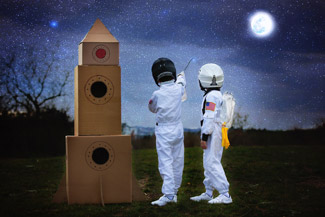 Reading this article will undoubtedly free certain readers of their guilt... There’s no denying it, all of us have caught ourselves daydreaming during a meeting at one time or another, right? Well, that may not necessarily be a bad thing! A study published in Neuropsychologia shows that having a wandering mind may actually be quite productive. What if the greatest daydreamers were also more efficient and creative than the rest of us?
Reading this article will undoubtedly free certain readers of their guilt... There’s no denying it, all of us have caught ourselves daydreaming during a meeting at one time or another, right? Well, that may not necessarily be a bad thing! A study published in Neuropsychologia shows that having a wandering mind may actually be quite productive. What if the greatest daydreamers were also more efficient and creative than the rest of us?While most of us spend part of our waking moments lost in thought, we accord little importance to this activity. According to J. Singer, a professor of psychology at Yale, we must distinguish two types of daydreaming that we experience at varying ...
Can sheep recognize Barack Obama?
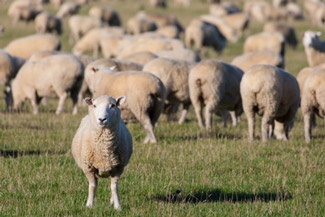 In addition to humans, we often discuss the cognitive capacities of ravens and chimpanzees in our newsletters. Well for this newsletter, we thought it was high time to take a look at sheep! A research team at Cambridge University (England) recently tested sheep’s ability to recognize famous human faces using photographs. Were the sheep able to identify Emma Watson and Barack Obama?
In addition to humans, we often discuss the cognitive capacities of ravens and chimpanzees in our newsletters. Well for this newsletter, we thought it was high time to take a look at sheep! A research team at Cambridge University (England) recently tested sheep’s ability to recognize famous human faces using photographs. Were the sheep able to identify Emma Watson and Barack Obama?Several studies have shown that, just like rhesus macaques, horses, dogs, and mocking birds, sheep have the ability to recognize both other sheep as well as familiar human faces. Yet we knew very little about their overall ability to recognize faces. To learn more, researchers from the Departments of ...
Can happy music make you more creative?
 For years, research in neuroscience and psychology has shown the virtues of music for the brain, particularly in terms of memory, attention, and learning. A recent study, conducted jointly in the Netherlands and Australia looked into the positive effect of happy music on people's creative potential. What if listening to a piece of joyful music could help us find innovative and original solutions?
For years, research in neuroscience and psychology has shown the virtues of music for the brain, particularly in terms of memory, attention, and learning. A recent study, conducted jointly in the Netherlands and Australia looked into the positive effect of happy music on people's creative potential. What if listening to a piece of joyful music could help us find innovative and original solutions?As Simone Ritter (Radboud University, the Netherlands) and Sam Ferguson (University of Sydney, Australia) point out: “Creativity can be considered one of the key competencies for the twenty-first century.” So it seems important for us to be able to study how to foster and improve it. ...
How can we get a better look at how babies brains work?
 Until now, if you wanted to study how babies' brains functioned and developed, there was no alternative to magnetic resonance imaging. Unfortunately, putting babies in an MRI machine and keeping them still isn’t exactly easy. But a French team has just developed a new ultrasound neuroimaging technique. How is this scientific innovation going to revolutionize the way we observe babies’ neuronal activity?
Until now, if you wanted to study how babies' brains functioned and developed, there was no alternative to magnetic resonance imaging. Unfortunately, putting babies in an MRI machine and keeping them still isn’t exactly easy. But a French team has just developed a new ultrasound neuroimaging technique. How is this scientific innovation going to revolutionize the way we observe babies’ neuronal activity?Even today, apart from data from neuroimaging and electroencephalography (which doesn't produce functional images), "we're completely in the dark when it comes to brain activity and development in babies,” says Mickael Tanter (who led the research team). Moreover, with very ...
Is it possible to locate Christmas spirit in the brain?
 Holly, turkey, chocolates, presents, reindeer, snow… Ah the magic of Christmas! But some people don’t enjoy this time of year and appear to be entirely lacking in "Christmas spirit." Until now, the phenomenon had escaped the scientific radar. But Danish researchers decided to conduct a (both serious and facetious) study to detect the "Magic of Christmas" in the human brain. What happens in the brains of Christmas addicts?
Holly, turkey, chocolates, presents, reindeer, snow… Ah the magic of Christmas! But some people don’t enjoy this time of year and appear to be entirely lacking in "Christmas spirit." Until now, the phenomenon had escaped the scientific radar. But Danish researchers decided to conduct a (both serious and facetious) study to detect the "Magic of Christmas" in the human brain. What happens in the brains of Christmas addicts?In order to locate “Christmas spirit" in the brain, researchers from the Departments of Neurology and Clinical Physiology, and Nuclear Medicine (University of Copenhagen, Denmark) compared a group of 10 people (8 men and 2 women) that had been celebrating ...
Can a chimpanzee learn to play rock-paper-scissors?
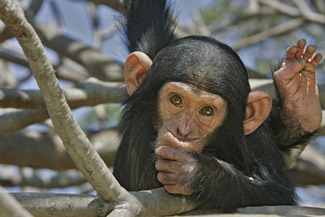 After watching all of the Planet of the Apes films, we noticed something disturbing: we never see primates playing rock-paper-scissors! And yet, they’re perfectly capable of playing. A recent study carried out by the University of Kyoto (Japan) and Beijing (China) shows that chimpanzees can learn to play this game and master it as well as a four year-old child. Read on to learn more about this discovery.
After watching all of the Planet of the Apes films, we noticed something disturbing: we never see primates playing rock-paper-scissors! And yet, they’re perfectly capable of playing. A recent study carried out by the University of Kyoto (Japan) and Beijing (China) shows that chimpanzees can learn to play this game and master it as well as a four year-old child. Read on to learn more about this discovery.The study, published in the journal Primates, aimed to determine whether chimpanzees could learn and master a "transverse" task. Rock-paper-scissors is the perfect game because it implements so-called circular relationships between three elements: the flat hand (paper) covers ...
How can a big scare lead to nightmares?
 Have you ever had a nightmare after experiencing a particularly frightening event during the day? Researchers from the New York University Neuroscience Institute studied the mechanisms behind this process of emotional memory reactivation. In their experiment, they exposed rats to a harmless experience with the help of a keyboard cleaner. So why do we have nightmares after experiencing a frightening situation?
Have you ever had a nightmare after experiencing a particularly frightening event during the day? Researchers from the New York University Neuroscience Institute studied the mechanisms behind this process of emotional memory reactivation. In their experiment, they exposed rats to a harmless experience with the help of a keyboard cleaner. So why do we have nightmares after experiencing a frightening situation? Just like humans, rats also store what are known as cognitive maps. The term was introduced in 1948 by E.C. Tolman who argued that rodents didn't just learn responses (turn right or left, go up or down), but were capable of building mental maps of their environment; in other ...
Is face recognition innate?
 In humans and primates, the ability to recognize faces has long been considered to be innate. This means that, from birth, the brain is “naturally” able to identify faces. But this innate view has been called into question by a recent study carried out by Harvard Medical School and published in Nature Neuroscience. What if facial recognition was actually a product of experience?
In humans and primates, the ability to recognize faces has long been considered to be innate. This means that, from birth, the brain is “naturally” able to identify faces. But this innate view has been called into question by a recent study carried out by Harvard Medical School and published in Nature Neuroscience. What if facial recognition was actually a product of experience?Studies on primate brain development indicate that the clusters of neurons responsible for facial recognition develop in the superior temporal sulcus at about 200 days. The region appears in various species of primates as well as humans. To better understand how the ability to recognize faces ...
Why is dancing good for the brain?
 As dictated by the eternal David Bowie, “Let’s Dance." And he’s right to encourage us to practice this art that’s not only good for the body… but also for the brain. Indeed, a recent study carried out by a German team of scientists has recently shown the benefits of dance on mental health, particularly in the elderly. And you don’t have to be a terrific dancer to enjoy the benefits! Why is dancing so good for our brains?
As dictated by the eternal David Bowie, “Let’s Dance." And he’s right to encourage us to practice this art that’s not only good for the body… but also for the brain. Indeed, a recent study carried out by a German team of scientists has recently shown the benefits of dance on mental health, particularly in the elderly. And you don’t have to be a terrific dancer to enjoy the benefits! Why is dancing so good for our brains? For their longitudinal study published in Frontiers in Human Neuroscience, the scientists examined the effects of regular dance practice on brain structure and function along with motor and cognitive performance and compared them with ...
Can ravens plan?
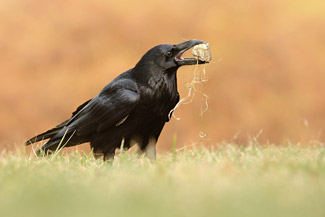 Grabbing an umbrella as we walk out the door demands a type of planning that requires us to be able to remove ourselves from the current situation (it’s not raining right now…) To project into the future (...but it might rain). This is based on elaborate cognitive skills that, up until now, were thought to only exist in humans and great apes. But a new study shows that ravens may also be capable of organizing by thinking about the future. How did the scientists make this surprising discovery?
Grabbing an umbrella as we walk out the door demands a type of planning that requires us to be able to remove ourselves from the current situation (it’s not raining right now…) To project into the future (...but it might rain). This is based on elaborate cognitive skills that, up until now, were thought to only exist in humans and great apes. But a new study shows that ravens may also be capable of organizing by thinking about the future. How did the scientists make this surprising discovery?Whether preparing dinner or a business plan, planning involves anticipating events and making decisions based on this "analysis." While this ability is specific to humans, several studies ...
Why do certain songs give us the chills?
 Personally, I get the chills every time I hear One by U2 or (in a totally different genre) Nessun Dorma sung by Pavarotti. Do you ever get goose bumps when listening to a piece of music? If you do, your brain may be "unique." Indeed, a recent study carried out by the University of Southern California indicates that people who vibrate in unison with music may have an increased capacity for feeling intense emotions. How does music affect the brain?
Personally, I get the chills every time I hear One by U2 or (in a totally different genre) Nessun Dorma sung by Pavarotti. Do you ever get goose bumps when listening to a piece of music? If you do, your brain may be "unique." Indeed, a recent study carried out by the University of Southern California indicates that people who vibrate in unison with music may have an increased capacity for feeling intense emotions. How does music affect the brain?As a prelude to their research, Matthew Sachs and his colleagues at the Brain & Creativity Institute remind us that the emotions provoked by an esthetic piece of work activate the same reward network in the brain that responds to the ...
Are questions with gestures more effective?
 While gestures vary between individuals and cultures, it's natural to gesticulate while speaking. More and more studies are looking into how these non-verbal signals affect our understanding. Do gestures facilitate or hinder comprehension? To shed light on the matter, a new Dutch study aims to demonstrate the positive effects of gestures when asking someone a question. How can adding gestures to a question make the interaction more effective?
While gestures vary between individuals and cultures, it's natural to gesticulate while speaking. More and more studies are looking into how these non-verbal signals affect our understanding. Do gestures facilitate or hinder comprehension? To shed light on the matter, a new Dutch study aims to demonstrate the positive effects of gestures when asking someone a question. How can adding gestures to a question make the interaction more effective? Oral communication is multimodal; it simultaneously solicits several semiotic systems: verbal (all of the areas related to “language": phonological, lexical, morphosyntactic, etc.), but also non-verbal (kinesics and proxemics) and ...
Is expensive wine really better?
 Quality undoubtedly comes at a price. But we also know that prices can influence our perception of a product. Studies have shown that the same product can be perceived differently depending on its price. This is called the “marketing placebo effect.” A new study published in Scientific Reports explains the role played by the brain in these sorts of price biases. How can the same person judge the same wine differently simply by changing the price?
Quality undoubtedly comes at a price. But we also know that prices can influence our perception of a product. Studies have shown that the same product can be perceived differently depending on its price. This is called the “marketing placebo effect.” A new study published in Scientific Reports explains the role played by the brain in these sorts of price biases. How can the same person judge the same wine differently simply by changing the price? Previous work carried out by the Franco-German research team (the Cognitive Neuroscience Laboratory / Economic Decision-Making group in Paris and the Center for Economics and Neuroscience in Bonn) showed that the price of a product ...
Does being bilingual increase your brain capacity?
 Over the past several years, J.M. Annoni, a neurologist and professor at the University of Friborg (Switzerland), has conducted studies on the effects of bilingualism on the brain. In an interview published in the Swiss journal Le Matin, the specialist in language development shed light on the impact of second language acquisition and learning on the brain. How is the brain able to manage two (or more) languages?
Over the past several years, J.M. Annoni, a neurologist and professor at the University of Friborg (Switzerland), has conducted studies on the effects of bilingualism on the brain. In an interview published in the Swiss journal Le Matin, the specialist in language development shed light on the impact of second language acquisition and learning on the brain. How is the brain able to manage two (or more) languages?The studies carried out by J.M. Annoni show just how flexible our brain can be, choosing between different strategies according to the context in which it is solicited. For example, a perfectly bilingual individual will tend to develop two ocular “reading modes” ...
Can seeds decide for themselves when to sprout?
 It’s generally accepted that seed germination is based on external factors such as humidity, temperature, and light. The chemical reactions caused by these stimuli affect the length of seed dormancy. But what if the seed itself decided when the time was right for germination? A study published in The Proceedings of the National Academy of Sciences (PNAS) tells us more about this possibility, implying that plants may have "brains."
It’s generally accepted that seed germination is based on external factors such as humidity, temperature, and light. The chemical reactions caused by these stimuli affect the length of seed dormancy. But what if the seed itself decided when the time was right for germination? A study published in The Proceedings of the National Academy of Sciences (PNAS) tells us more about this possibility, implying that plants may have "brains."The research team, composed of researchers from the School of Biosciences (University of Birmingham, United Kingdom) and the Department of Cell and Systems Biology (University of Toronto, Canada), wanted to better understand the mechanisms used by the ...
Does being generous make us happier?
 Be generous, it will make you happy! This could be the conclusion of a study carried out by an international team of neurobiologists from the universities of Lübeck (Germany), Chicago (United States), and Zurich (Switzerland). Using magnetic resonance imaging (MRI), the researchers discovered a neural link between generosity and happiness. How were they able to isolate this relationship in the brain?
Be generous, it will make you happy! This could be the conclusion of a study carried out by an international team of neurobiologists from the universities of Lübeck (Germany), Chicago (United States), and Zurich (Switzerland). Using magnetic resonance imaging (MRI), the researchers discovered a neural link between generosity and happiness. How were they able to isolate this relationship in the brain?Among the studies seeking to uncover the motives for generous behavior, it’s undoubtedly those in psychology that, since the year 2000, have put forward the most interesting hypothesis: what if altruism and generosity made us happy? While the positive emotion induced by generous ...
Right eye or left eye? Which do you prefer?
 “Beauty is in the eye of the beholder,” as the saying goes. Who would have thought this old proverb could be so true? Imagine you’re about to gaze upon a famous painting. Which eye would you use? Except for those of us who are ambidextrous, each of us is either right or left-handed. But this form of laterality doesn’t just apply to our hands and feet, it’s also true for the eyes. Why do we have a dominant eye?
“Beauty is in the eye of the beholder,” as the saying goes. Who would have thought this old proverb could be so true? Imagine you’re about to gaze upon a famous painting. Which eye would you use? Except for those of us who are ambidextrous, each of us is either right or left-handed. But this form of laterality doesn’t just apply to our hands and feet, it’s also true for the eyes. Why do we have a dominant eye? Unless you practice archery or another precision sport, or if you’ve ever needed to look through a keyhole, it's unlikely you're aware of which eye is dominant. But if you have a tendency to favor your right hand or right foot in various activities, the same is ...
Can words influence pupil dilation?
 We know that our pupils dilate (mydriasis) and contract (mycosis) depending on ambient light and our mood. A recent study conducted by researchers at Aix-Marseille University’s laboratories of Cognitive Psychology, and Speech and Language, along with the University of Groningen (Netherlands) shows that the meaning of a word also influences the size of our pupils. How can a word trigger pupil dilation or contraction?
We know that our pupils dilate (mydriasis) and contract (mycosis) depending on ambient light and our mood. A recent study conducted by researchers at Aix-Marseille University’s laboratories of Cognitive Psychology, and Speech and Language, along with the University of Groningen (Netherlands) shows that the meaning of a word also influences the size of our pupils. How can a word trigger pupil dilation or contraction?
During the 70s, Eckward Hess, a pioneer in pupillometry (and former head of the psychology department at the University of Chicago) observed that, in general, pupil size increases when a person observes something or someone "stimulating." Ads for cosmetics have ...
Do ravens hold a grudge?
 Many studies have already demonstrated the intellectual abilities of corvids, such as crows, magpies, and ravens. A scientific team from the University of Vienna (Austria) and the department of cognitive sciences at Lund University (Sweden) tested the memory capacities of crows. By subjecting them to a rather unusual experiment, the researchers discovered that ravens are rather spiteful creatures…
Many studies have already demonstrated the intellectual abilities of corvids, such as crows, magpies, and ravens. A scientific team from the University of Vienna (Austria) and the department of cognitive sciences at Lund University (Sweden) tested the memory capacities of crows. By subjecting them to a rather unusual experiment, the researchers discovered that ravens are rather spiteful creatures…
J.J.A. Müller and colleagues tested the memory of nine ravens in an exchange paradigm with humans (reciprocity). Laggie, Horst, Louise, Nobel, and the other ravens had the opportunity to exchange a low-quality food (bread) for a high-quality food (cheese); experiments have shown ...
Can spider venom protect your brain?
 Its name: Hadronyche infensa or the “Darling Downs funnel web spider” (the name of a vast farming area in Australia): a very toxic poisonous spider. But this creature may also have an unexpected virtue: protecting the brain from neural damage caused by a stroke. How did Australian researchers chance upon this discovery? Read on to find out more about this study published in PNAS.
Its name: Hadronyche infensa or the “Darling Downs funnel web spider” (the name of a vast farming area in Australia): a very toxic poisonous spider. But this creature may also have an unexpected virtue: protecting the brain from neural damage caused by a stroke. How did Australian researchers chance upon this discovery? Read on to find out more about this study published in PNAS.
One of the studies main authors, Professor Glenn King from the Institute for Molecular Bioscience at the University of Queensland (Australia) says, “We believe that we have, for the first time, found a way to minimize the effects of brain damage after a stroke.” These encouraging remarks are ...
Is GPS bad for your brain?
 For many people GPS is a beneficial form of technology. But letting yourself be guided vocally (or even just visually) by a GPS could actually be harmful to your brain in the long run. A study published in the review Nature Communication tells us why following the instructions given by a virtual guidance device could impair our brain’s orientation functions, e.g. our internal GPS.
For many people GPS is a beneficial form of technology. But letting yourself be guided vocally (or even just visually) by a GPS could actually be harmful to your brain in the long run. A study published in the review Nature Communication tells us why following the instructions given by a virtual guidance device could impair our brain’s orientation functions, e.g. our internal GPS.
It began in 2014 when a team of researchers (Edvard and May-Britt Moser, and John O’Keefe) shed light on the existence of a tracking and navigation system in the human brain. Their research showed that cells in the hippocampus helped animals to record spatial information in order to orient ...
How to become a memory athlete
 You’re undoubtedly already familiar with memory champions that are capable of easily memorizing tens, hundreds, or thousands of pieces of information (word, numbers, faces, etc.) A recent study published in Neuron shows that, from a cerebral point of view, they’re not really so different from the rest of us. And that with training we can also considerably increase our memorization abilities and even compete with these athletes!
You’re undoubtedly already familiar with memory champions that are capable of easily memorizing tens, hundreds, or thousands of pieces of information (word, numbers, faces, etc.) A recent study published in Neuron shows that, from a cerebral point of view, they’re not really so different from the rest of us. And that with training we can also considerably increase our memorization abilities and even compete with these athletes!
In order to better understand the brain features of people with highly developed memorization skills, the research team led by Martin Dresler (of the Radboud University Medical Center in the Netherlands) decided to study the 23 top participants in ...







